By-election: Is Tory marginal Wakefield ready to go red again?
- Published
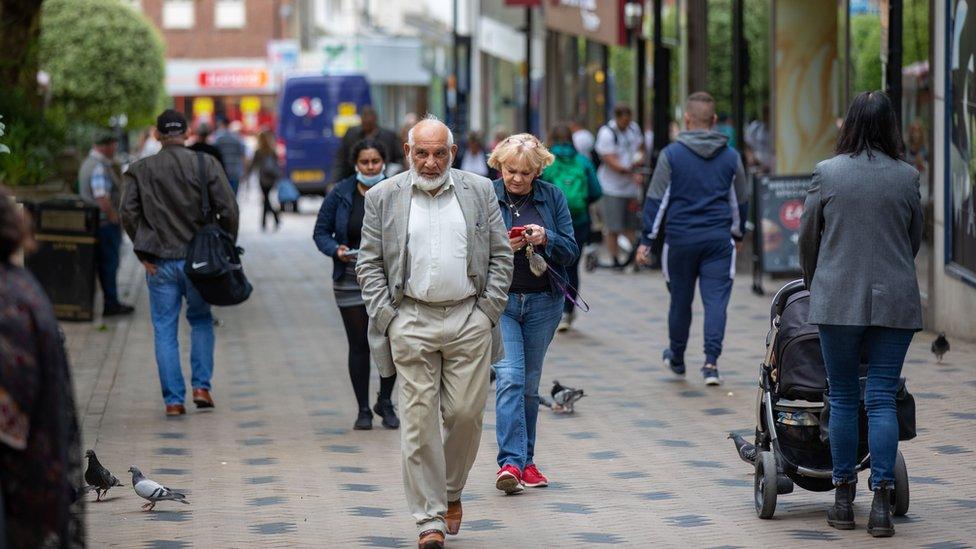
Wakefield goes to the polls next Thursday in a closely-watched by-election
Wakefield, in West Yorkshire, was part of Labour's "red wall" which crumbled to the Conservatives in the 2019 general election. Sir Keir Starmer knows Labour needs to win it back in next week's by-election if his party is to convince voters it can form the next government.
The neon lights in Richard Wheater's workshop change from red to blue, and back to red again.
Labour will be hoping that enough voters in Wakefield do the same next week.
Richard voted Conservative for the first time in 2019, but is now having second thoughts.
He told me he had wanted Labour to ditch Jeremy Corbyn, and had cast something of a protest vote for the Tories. He's now undecided, but is listening closely to the local Labour candidate's pitch.
'For me, this isn't about Boris Johnson. It's about local leadership and making things happen positively for Wakefield and its people," he says.

Are Richard Wheater's neon signs a guide to how the polls will go?
Mr Wheater is one of the swing voters that will determine whether Labour can overturn the Conservative majority of 3,358, gained when they won Wakefield for the first time since 1932.
Working class voters
The constituency is seen not so much as a brick in the "red wall" of traditional Labour seats snatched by Boris Johnson's party on a promise to "get Brexit done" - but something of a foundation.
It's a test of whether the defection of white working-class voters, in particular, to the Conservatives in swathes of northern England is temporary or permanent.
To underline the by-election's importance to Labour, Sir Keir Starmer has already visited twice and will be back before polling day. It also suggests a high degree of confidence that his candidate will win.
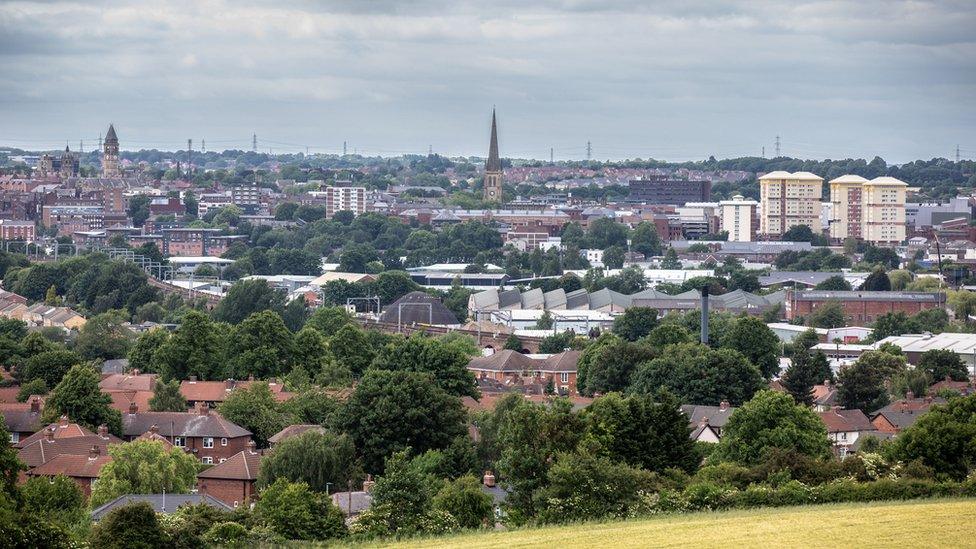
You are never far from open countryside in Wakefield
To be fair, as one Conservative insider points out, the opposition parties have been given a fair wind in the two by-elections taking place in England on 23 June.
"In one seat the MP was a paedophile, in the other he was caught watching porn," the insider says.
The former is reference to Imran Ahmad Khan in Wakefield, sent to prison for sexually assaulting a 15-year-old old boy. The latter is a dig at Neil Parish, the former MP for Tiverton and Honiton - where the Liberal Democrats are the main challengers.
Leaflet anger
Ben Harrison, a young university graduate I met on the doorstep in Netherton, a fiercely-contested part of the Wakefield constituency, said Khan's behaviour was having a "big impact" on the campaign,
"It's not a good look," he added.
Labour were not slow to highlight Khan's conviction in a leaflet entitled "Tory shame", with a picture of the former MP and a stark question: "Who next?"
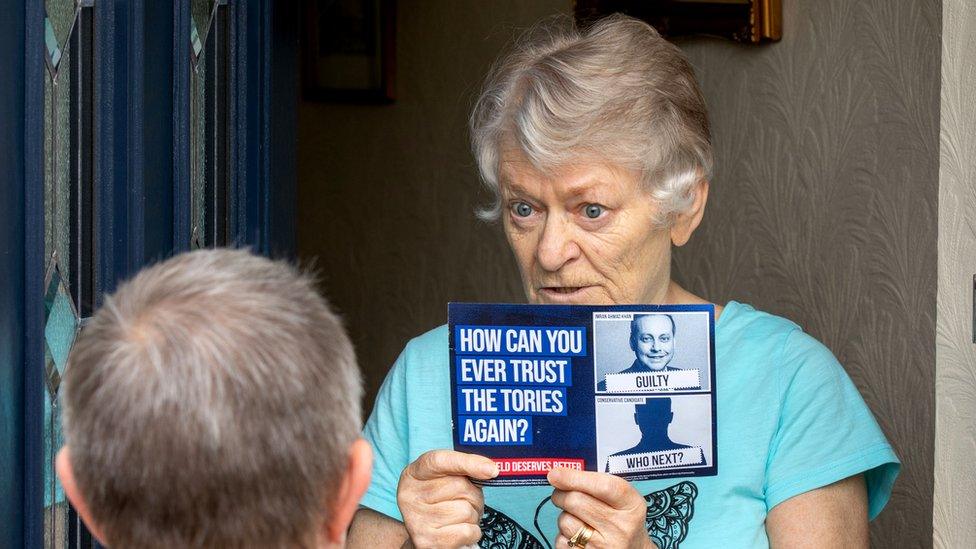
Labour's election leaflet angered Carole, who felt it was too negative
This had outraged Carole, who until recently tended to vote Labour, but told me she had been shocked to see a negative, attack leaflet land on her doormat.
She said she had emailed Labour to complain about the leaflet, which had not been included in the campaign literature I had requested from the party, but had not received a response.
"They can't justify it," she told me.
"We vote for policies and what they are going to do, not for a person. I said in my email 'Where are your policies - tell me what you are going to do?'"
Labour say they have not put out any "attack" literature of this kind in weeks - and only once since their candidate, Simon Lightwood, was selected.
The party is also issuing leaflets and newsletters about policies, but these are carefully targeted at different parts of what is a diverse constituency - the city of Wakefield is surrounded by former mining communities and a rural hinterland.
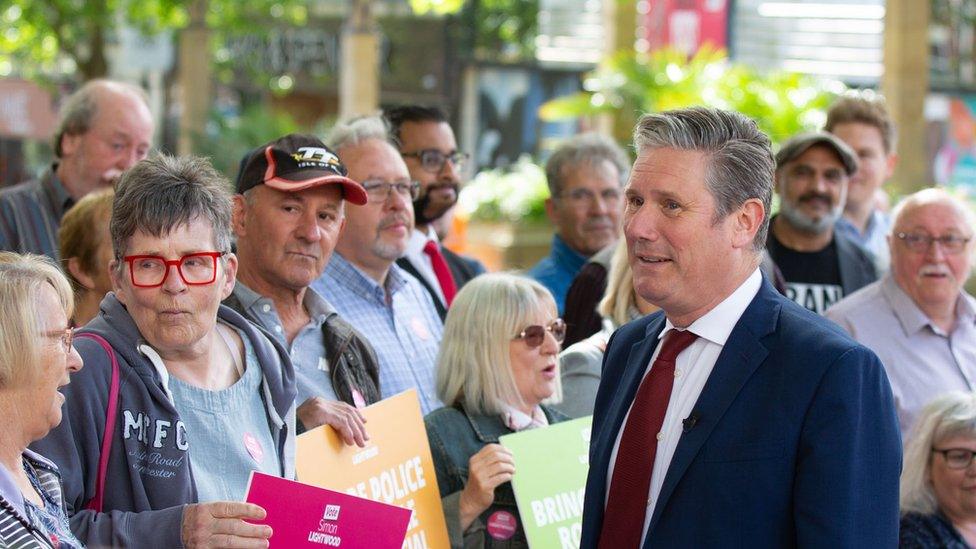
Sir Keir Starmer meets Labour activists on a campaign visit
So, for example, while there are constituency-wide messages, such as scrapping the National Insurance rise or the need for more police, the state of local bus services is especially emphasised in the villages.
But Labour are also continuing to target personalities. Well, one personality in particular - Boris Johnson.
'Thatcher wouldn't lie'
The party is urging traditional Conservative voters to "lend" their support to Labour, to help kick Mr Johnson out of Downing Street.
Lifelong Conservative John Dyer, a former Royal Marine, who now gets around - at breakneck pace - on a mobility scooter, told me his political allegiances were on the move too, thanks to the PM's behaviour.
"I have to say - and I hoped I don't get sued for this - but he [Boris Johnson] is an oaf.
"He is sort of the centrepiece of everything that has deteriorated. I was a great believer - and still am - in Margaret Thatcher. You may not like her, but she wouldn't lie."
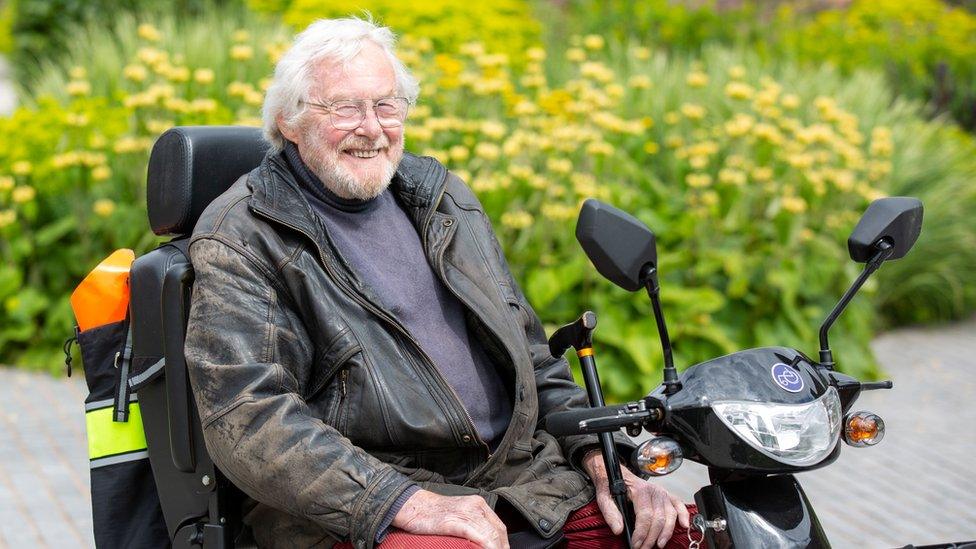
Tory voter John Dyer is not impressed by the prime minister
He is not totally convinced by Sir Keir Starmer, describing him as "not strong enough", but said he has hopes that the Labour leader will improve.
Former Labour voters John and Jane - who have lived in Wakefield for many years - said they saw the prime minster as flawed, but still felt he was better than the alternatives.
"He [Boris Johnson] has made mistakes," Jane told me, "but to be honest I don't care if he had a piece of cake at his party."
Selection row
Labour insist they have a great "ground operation" in Wakefield - contacting more voters than at many by-elections.
But two party members I spoke to off the record said this does not tell the whole story.
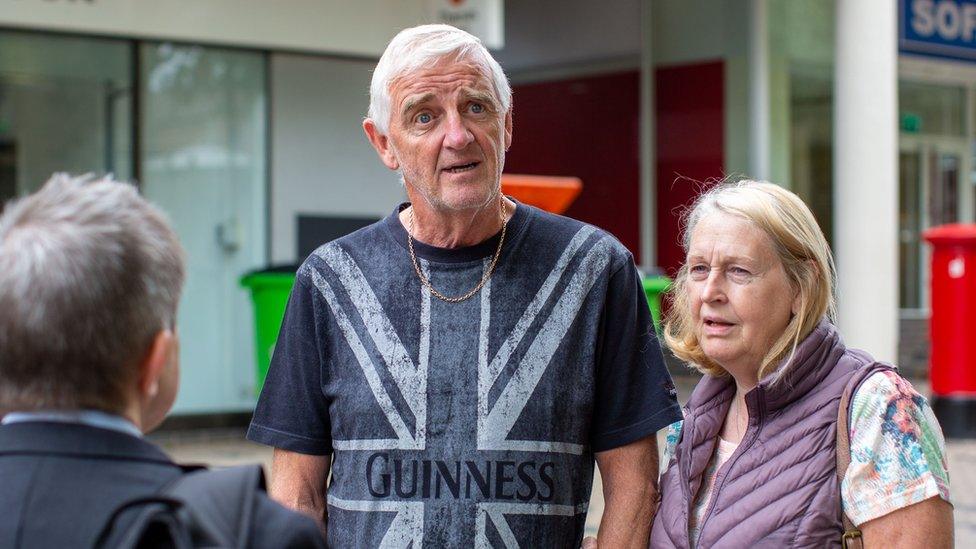
John and Jane are sticking with Boris Johnson
One said: 'We've made a personal choice not to campaign [in the by-election] because of the selection process - not because we don't support Labour. A significant amount of our activists are doing the same. If I campaigned it would feel that I was endorsing the process."
Left wingers in particular felt local candidates were frozen out in favour of those approved by Labour HQ in London - 16 members of the Wakefield party executive walked out over it.
The pair I spoke to insisted that not all the local would-be candidates were "Corbynites".
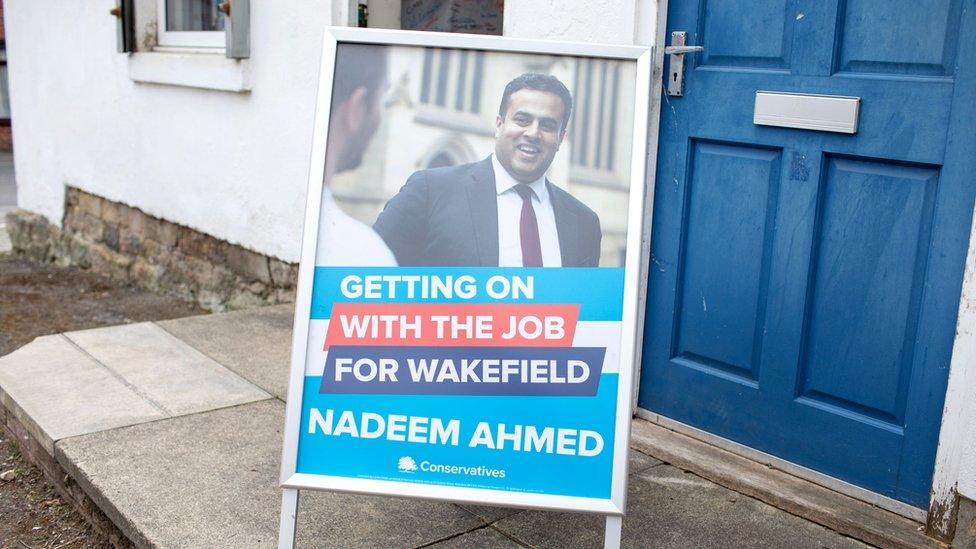
The Conservatives selected a candidate who lives in the constituency
But they claimed local membership has fallen by a quarter since Keir Starmer became party leader, which they warned could harm the party's ability to get out the vote at a general election.
'Less than optimal'
Labour insisted candidate Simon Lightwood had strong local connections, having worked for MP Mary Creagh, when she held the seat, and many local activists had taken part in the selection process.
The Conservatives have also had a little local difficulty. They chose a candidate, Nadeem Ahmed, who lives in the constituency.
But the fact that he lost a vote of confidence among his Tory colleagues on the local council last year, allowed Labour to run a social media ad reminding people that 40% of Tories had no confidence in Boris Johnson.
A Labour insider said it had been the most successful ad of the campaign so far.
Against this "less than optimal backdrop", as one Conservative campaign insider put it, the feeling is that the Tory vote has not taken a total hammering.
Interestingly, where Labour and the Conservatives agree is that polls suggesting a substantial swing to the opposition are not matched by the reality on the ground.
Of course, this message is in both parties' interests - talk of a closer race might prompt longstanding Conservatives to go to the polls while for Labour, it would guard against complacency.

Paymen Karimi wants Boris Johnson to put Partygate behind him
In truth, at Conservative HQ there is talk of how to "manage" news of a defeat. While Labour insiders expect to win, they don't think it will be "seismic" so they too have to manage expectations.
'Go forward'
So far, Boris Johnson has not visited Wakefield, and I'm told front-rank government ministers tend to pop in briefly to gladhand the Conservative candidate, knock off an endorsement video and head back to Westminster.
But more than 70 Tory MPs have done the hard yards of door-knocking and leafleting in the constituency, with campaign literature pointing to police recruitment, promises on jobs, and "taking back control of immigration".
In a seat where nearly two thirds of voters backed Brexit, one MP from a nearby seat expressed relief but also surprise that the vote was holding up in the area where he was canvassing.
That said, the vote of confidence in the prime minister was taking place at Westminster just as people in Wakefield were receiving their postal vote forms.
Campaigners say that while Partygate has hardened the views of those already disenchanted with the PM, his supporters are ready to move on.
And the party is retaining some recent support for other reasons.
Paymen Karimi, who owns a chain of restaurants in West Yorkshire employing 300 people, says was grateful to the government for the furlough scheme.
He decried what he saw as a lack of policies from Labour and praised Boris Johnson for standing up to his own backbenchers.
He even had some sympathy for the PM over Partygate, as one of his own restaurants had incurred a lockdown fine, external. saying it was time for the PM to "go forward and look at the problems of the country".
Apathy or hostility?
There is no shortage of options if voters decide that neither the main party of government or opposition at Westminster warrants their vote.

Which way will Wakefield go next Thursday?
The Yorkshire Party's candidate David Herdson was a Conservative until 2019 - and left after Boris Johnson became the party leader. He is campaigning for a regional parliament for Yorkshire, an expansion in house-building, and scrapping VAT on energy bills.
Reform UK - the former Brexit Party - say they are picking up not so much apathy as hostility towards mainstream parties particularly, though not exclusively, in former mining communities outside the city of Wakefield.
Their candidate, Chris Walsh, is campaigning for lower taxes, cheaper energy and secure borders.
The party has called for withdrawal from the European Convention on Human Rights following the legal action which grounded the migrant flight to Rwanda.
The Liberal Democrats' presence isn't hugely obvious around Wakefield but they say there is no pact with Labour to keep a low profile.
They have been canvassing with an aim of building up local support, and their candidate - Jamie Needle - also ran in the 2019 election. But a spokesman added: 'We know where we can get a good result -Tiverton. It's very close there."
Here in Wakefield the Lib Dem message on the doorstep is that "the Conservatives have let you down". And their leaflets call for "urgent action on the cost of living and cleaning up the local waterways".
'Spoiled brat'
The political parties aren't just fighting each other.
For all the activity on Wakefield's doorsteps, they are, they say, often met with apathy.
Labour are worried in particular that people will assume that they will now win, and too many won't bother to vote.
And perhaps that isn't entirely misplaced.
Janine, who lives in affluent Newmillerdam, told me she was no fan of Boris Johnson.
"Oh he needs his nappy changing - he is a spoiled brat. He needs grounding, like I did with my children!"
So would she be voting to try to oust him?
"I haven't voted for 10 years," she says, adding that in her view politicians were all useless.
Next Thursday, we will know the verdict of those voters who do participate.
With a prime minister apparently put on probation by sections of his parliamentary party and grumbles within Labour's ranks about Sir Keir Starmer's style of leadership, the result in Wakefield will have a big impact at Westminster.